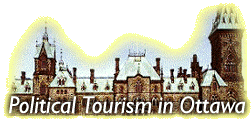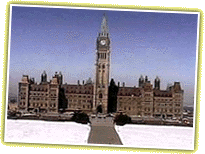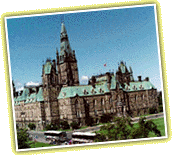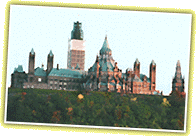|

For some tourists, the highpoint of a trip might be a sacred
afternoon spent in a museum or an evening enjoying a memorable meal
or perhaps skiing one last time down the slope of some exotic resort.
However, there's a genre of tourism we might call "political tourism."
Kitty Felde reports from Ottawa.
Political Tourism in Ottawa
By Kitty Felde
You know you're married to a political junkie when the first thing your
husband wants to do once you get to your hotel is turn on C-SPAN. So it
didn't surprise me that the first thing he wanted to see when we arrived in
the Canadian capital city of Ottawa was the Canadian Parliament.
 The Parliament buildings themselves look a bit like a gothic Cinderella's
castle sitting up on a hill overlooking the Ottawa River. The original
structures -- except for the library -- were destroyed by fire in 1916.
The Parliament buildings themselves look a bit like a gothic Cinderella's
castle sitting up on a hill overlooking the Ottawa River. The original
structures -- except for the library -- were destroyed by fire in 1916.
We joined a guided tour of Parliament led by college student Patrick
Thompson.
Thompson: There's rumors how the fire got started: some say a candle fell
over onto newspapers others say someone dropped a cigarette on newspapers;
and the building went up. But the way the library was saved, the
librarian closed two steel doors, they're still there and visitors tell me
it's a symbol of luck.
Architecture aside, it was politics we came to see. And on any day that
Parliament is in session, the public -- tourists included -- are allowed to
sit in the gallery of the House of Commons or the Senate and watch Canadian
politicians in action. Michael O'Shaunesy, who
works for the Department of Foreign Affairs, says if you listen carefully
as you wander the halls of Parliament, you'll know when something is about
to happen.
O'Shaunesy: What's
going on now are bells calling members to vote in Parliament. So they could
be in their offices or working anywhere in the building and when they hear the
bell, they know: "Let's get to work."
 Perhaps the most interesting difference between the Canadian and American
systems of government is the daily question period. Every day, the
Canadian Prime Minister and all of his or her Cabinet Ministers answer
questions -- in English and in French -- posed by members of Parliament
about affairs of state. And if you're a tourist, it's great theatre. And
it's
free. On this particular afternoon, the hottest debate was over subsidies
for Canadian farmers, who were having difficulty competing on a global
marketplace.
Perhaps the most interesting difference between the Canadian and American
systems of government is the daily question period. Every day, the
Canadian Prime Minister and all of his or her Cabinet Ministers answer
questions -- in English and in French -- posed by members of Parliament
about affairs of state. And if you're a tourist, it's great theatre. And
it's
free. On this particular afternoon, the hottest debate was over subsidies
for Canadian farmers, who were having difficulty competing on a global
marketplace.
MP: Why doesn't the Prime Minister start tackling and take on the
American and European bullies for their huge subsidies for farmers?
Speaker: The honorable Minister of Agriculture.
Minister of Agriculture: Mr. Speaker, I find these comments strange from
the party that didn't want to support agriculture.
Catcalls are part of the game here, perfectly acceptable. Whereas in our
Congress, it's more often the exception than the rule. Tour guide Patrick
Thompson says the party in power and the opposition parties sit on opposite
sides of the chamber -- a British practice carried over from the days when
MP's (members of Parliament) would spar with more than just words.
Thompson: The distance between the two sides is 2 and 1/2 swords. Because
in London you were allowed to bring swords, but never allowed to reach each
other.
 There's also an amazing amount of American history you can learn outside
the U.S. For example, I never knew that Canadians were a bit nervous after
the American Civil War because England had supported the South and they
feared Americans would retaliate by invading British territory to the
north. That's one reason Canada decided to confederate and become a nation
and why Ottawa was chosen as site of the nation's capital.
There's also an amazing amount of American history you can learn outside
the U.S. For example, I never knew that Canadians were a bit nervous after
the American Civil War because England had supported the South and they
feared Americans would retaliate by invading British territory to the
north. That's one reason Canada decided to confederate and become a nation
and why Ottawa was chosen as site of the nation's capital.
Thompson: This was in the middle of nowhere. Basically, it was surrounded
by wood. This used to be a lumber town. And the reason they picked it was
if ever the American troops left the American border and came to try to
find our capital, they wouldn't be able to find it, because they'd get lost
in the woods.
Back in our hotel room, my husband suggested returning for a second day of
Parliamentary debate. Until he began channel surfing and discovered the
Canadian version of C-SPAN -- CPAC.
I guess this is what political compromise is all about. From
Ottawa, I'm Kitty Felde for the Savvy Traveler.
For More Information:
Want to be a virtual political tourist?
| 




 The Parliament buildings themselves look a bit like a gothic Cinderella's
castle sitting up on a hill overlooking the Ottawa River. The original
structures -- except for the library -- were destroyed by fire in 1916.
The Parliament buildings themselves look a bit like a gothic Cinderella's
castle sitting up on a hill overlooking the Ottawa River. The original
structures -- except for the library -- were destroyed by fire in 1916.
 Perhaps the most interesting difference between the Canadian and American
systems of government is the daily question period. Every day, the
Canadian Prime Minister and all of his or her Cabinet Ministers answer
questions -- in English and in French -- posed by members of Parliament
about affairs of state. And if you're a tourist, it's great theatre. And
it's
free. On this particular afternoon, the hottest debate was over subsidies
for Canadian farmers, who were having difficulty competing on a global
marketplace.
Perhaps the most interesting difference between the Canadian and American
systems of government is the daily question period. Every day, the
Canadian Prime Minister and all of his or her Cabinet Ministers answer
questions -- in English and in French -- posed by members of Parliament
about affairs of state. And if you're a tourist, it's great theatre. And
it's
free. On this particular afternoon, the hottest debate was over subsidies
for Canadian farmers, who were having difficulty competing on a global
marketplace.
 There's also an amazing amount of American history you can learn outside
the U.S. For example, I never knew that Canadians were a bit nervous after
the American Civil War because England had supported the South and they
feared Americans would retaliate by invading British territory to the
north. That's one reason Canada decided to confederate and become a nation
and why Ottawa was chosen as site of the nation's capital.
There's also an amazing amount of American history you can learn outside
the U.S. For example, I never knew that Canadians were a bit nervous after
the American Civil War because England had supported the South and they
feared Americans would retaliate by invading British territory to the
north. That's one reason Canada decided to confederate and become a nation
and why Ottawa was chosen as site of the nation's capital.